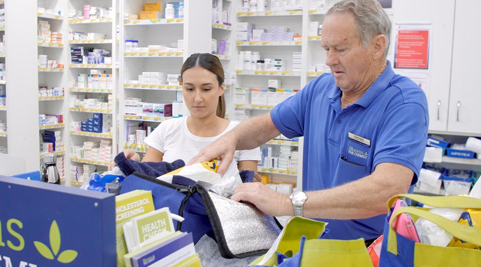By Suzanne Greenwood, Executive Director

COVID-19 has tested and challenged community pharmacies across the whole country, but none more so than those in regional, rural and remote areas.
The response by these pharmacies in the face of almost unrelenting adversity has been amazing and has highlighted the importance of community pharmacies, not only to the health of patients and communities, but also to local economies of the areas in which they are located.
Broadening the reach of community pharmacies in regional, rural and remote areas not only improves the health outcomes of people in the communities they serve, but also helps their economic wellbeing.
Across Australia, the local community pharmacy is often a major employer, as well as being a health hub, an economic hub, a community centre and a meeting place providing social and mental health support. Local community members can find full-time, part-time and casual work in their pharmacies, and these are often stepping stones for rewarding careers. A small pharmacy in a small town can employ a lot of people, even if some are employed for only a few hours a week or fortnight.
This community focus is one of the many things that has impressed me, as these pharmacies continue to operate sometimes under the most trying of conditions and circumstances.
Their stories are often poignant – and nearly always inspirational – and as such, I felt well worth sharing with you. So, from today in Forefront, we are beginning an occasional series of profiles of some of these regional, rural and remote pharmacies so that you too can share a sense of how they operate, and their amazing commitment to their patients and communities.
They face difficulties their urban counterparts do not always have to contend with; medicines shortages, difficulties in finding staff, additional costs for freight and infrastructure, and long-distance deliveries, to name just a few.
But, almost without exception, they say these are more than balanced by the sense of community and inclusion among the people they serve. In turn, these communities benefit in many ways.
It seems that going above and beyond is becoming something of a common practice for community pharmacists in regional, rural and remote areas, and again we have seen examples during the recent floods in Queensland and NSW.
With increasing regularity, these pharmacists are being called on to do that extra bit to help their communities, especially during emergencies, and their responses are something that the whole profession can be proud of.
They also showcase to the country – as a whole – the importance of community pharmacies in regional, rural and remote areas.
This has been further highlighted by the appointment of Australia’s first Indigenous pharmacist, Associate Professor Dr Faye McMillan, as one of two new Deputy National Rural Health Commissioners.
In this position, Dr McMillan will play a key role in the Federal Government’s agenda to increase access to rural health services and address rural workforce shortages.
Dr McMillan, a Wiradjuri yinaa (woman), has diverse experience in the rural health sector, including her work to establish Indigenous Allied Health Australia. She also brings to the role her expertise as a practising rural pharmacist.
The Guild’s advocacy work for regional, rural and remote pharmacies and their patients is a major feature of our work, and as a result, we have been made a permanent member of the Rural Health Stakeholder Roundtable from this year.
We also are a founding member of the Spinifex Network – a rural health and medical research network seeking to build rural research capacity.
The Guild also works closely with the National Rural Health Alliance; some examples of recent collaboration include input into the Alliance’s submissions to House of Representatives Select Committee on Mental Health and Suicide and the Sub-Committee Inquiry into Rural Health Services in Tasmania.
In addition, the Guild regularly meets politicians at all State, Territory and Federal levels to advocate for our members and their communities.
Underpinning much of this advocacy are the Guild’s submissions to Government inquiries, including recent input to Sub-Committee Inquiry into Rural Health Services in Tasmania, the Rural and Remote Health and Wellbeing Strategy 2021-2026 in Queensland, and the Joint Standing Committee Inquiry into Australia’s Skilled Migration Program.


